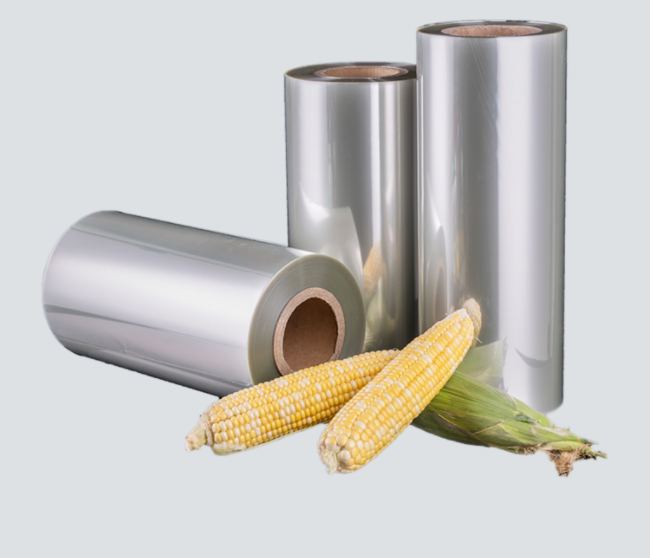New Biofilm Materials – BOPLA film
BOPLA (biaxially stretched polylactic acid film) is a high-quality biological substrate material obtained through material and process innovation using biaxially stretched technology, using biodegradable material PLA (polylactic acid) as the raw material. BOPLA is currently the most successfully applied PLA film, and the heat-resistant temperature of the PLA film after biaxial stretching and heat setting can be increased to 90 ℃, which just compensates for the lack of high-temperature resistance of PLA.

By adjusting the biaxial stretching orientation and shaping process, the heat sealing temperature of BOPLA film can also be controlled at 70-160 ℃. This advantage is not possessed by ordinary BOPET. In addition, BOPLA film has a light transmittance of 94%, extremely low haze, and excellent surface gloss. This type of film can be used for flower packaging, envelope transparent window film, candy packaging, and so on.
BOPLA should be stored in dry and ventilated storage conditions, away from heat sources, and away from direct sunlight.
Advantages and Applications:
Compared with traditional fossil based polymers, BOPLA has the advantages of high safety and environmental friendliness; Moreover, due to the raw material being PLA (polylactic acid) derived from biological sources, it has a significant effect on carbon reduction, with a carbon footprint and emissions reduction of over 68% compared to traditional fossil based plastics. Moreover, the ease of processing, heat sealing, aesthetics, anti fogging, antibacterial properties, and good mechanical properties further expand the application field of BOPLA. It can be widely used in the fields of disposable film materials such as fresh fruits and vegetables, flowers, packaging tapes, and soft packaging functional film materials such as food, electronic products, books, clothing, etc. It has a wide range of positive significance for packaging reduction, environmental protection, and carbon reduction.
Breakthrough and improvement:
Although PLA has been in mass production for over 20 years and has been widely used in many fields, there have been few breakthroughs in the technology of biaxial stretching. In addition to being 100% biodegradable and 100% bio based raw materials, the bio based membrane material BOPLA produced in YiTo has made further breakthroughs in processing technology. The biaxial stretching process not only greatly improves the mechanical properties of PLA films, but also endows the membrane material with a thinner thickness (ranging from 10 to 50) μ m) Make the process of material disintegration and microbial erosion faster and easier to degrade. In the case of industrial composting, ordinary PLA products can achieve complete degradation into water and carbon dioxide within six months at the earliest. After biaxial stretching, BOPLA increases the specific surface area of the material and controls its crystallization through improved processing technology and formula, greatly shortening the degradation time.
Policies and expectations:
In the past two years, the country’s attention to plastic pollution control has continued to increase. Multiple ministries and various provinces and municipalities have successively issued “plastic prohibition orders” prohibiting and restricting disposable non degradable plastics. The government encourages the research and development, promotion, and application of fully biodegradable plastic substitute products, especially strengthening the research and development innovation of key core technologies, promoting the industrialization and greening of plastic products and substitutes, and creating a favorable market environment for the research and development, production, and sales of BOPLA.
For more in detail , please contact : williamchan@yitolibrary.com
BOPLA Film – HuiZhou YITO Packaging Co., Ltd.
Post time: Sep-23-2023
